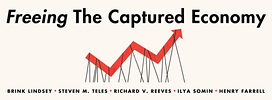Mea culpa. In my first response, I badly misstated Ilya Somin’s position, falsely equating his “foot voters” with Fischel’s “homevoters.” I described them as “close cousins.” In fact, they are no relation at all. They are, rather, rivals. Somin believes that onerous zoning regulations (a favorite tool of homevoters) get in the way of the kind of market-driven movements made by foot voters. My apologies.
The subsequent exchange between Somin and Lindsey has been fascinating. Somin takes a purer libertarian view. He suggests that any government apparatus is almost inevitably at risk of being captured. The way to avoid government being captured is to get rid of government, as far as possible. Lindsey, by contrast, has come to believe that first, regulations can be designed in such a way as to minimize the risk of capture, and that second, we are highly unlikely to abandon regulations altogether. Somin wants to roll back the regulatory state. Lindsey wants to reform it.
I do not propose to adjudicate here between these positions. But they face a similar political problem. Whether the goal is to reform or remove regulations, a big obstacle has to be overcome: the solid wall of upper middle-class resistance. I am writing today from Berkeley, the affluent San Francisco suburb, where an argument is raging over a proposed change to zoning laws. California State Senator Scott Wiener has introduced SB827, described as a “Transit Zoning Bill.” If the bill becomes law, it will override local zoning restrictions and permit new housing built up to eight stories tall near major transit hubs. By linking new development to transit, the Bill aims to ameliorate concerns about traffic congestion and parking.
The bill represents a potentially important step towards a saner zoning policy. It is not universally popular, however, especially in parts of Los Angeles or in liberal Berkeley. Local leaders and influencers have reacted strongly. SB827 has been described as “a declaration of war on every urban community in California.” The influential editor of The Berkeley Daily Planet, Becky O’Malley says it is time “to put the war paint on.”
Loosening restrictions on local zoning laws would be good for the country, good for the economy, good for the environment, and good for middle class and working-class Americans. The trouble is, it won’t necessarily be good for the mostly well-off people who benefit from those restrictions; or at the very least, they don’t think it will be good. The value of their home may not rise quite as quickly. Their neighborhoods may be a little busier. Their local public schools may be a little more economically diverse.
One can hope that more of these people will come to voluntarily dampen their self-interest, just a little, for the collective good. Perhaps one day the YIMBYs will outnumber the NIMBYs in the upper middle class. But we should not hold our breath. Some of the power of local government will have to be curbed in the interests of freeing up the market in land. Watch SB827 with interest.

